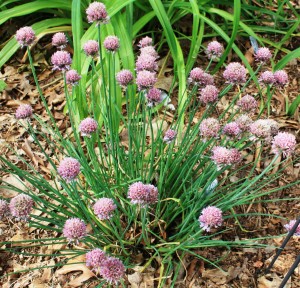Growing and using Chives (Allium schoenoprasum) with it early spring purple flower is one of the most popular culinary herbs found in herb gardens. The flowers along with the leaves are edible and can be grown both indoors and outdoors. Chives are a member of the alliums genus and are used as companion plant, and both medicinally and culinary.
The leaves can be used all summer long and have a mild onion like flavor and are great on a variety of foods. The leaves contain large amount of Vitamin A and C. Onion chives have purple flowers and garlic chives have a white star like flowers.
Growing Chives: Chives makes great border plants, in the herb garden, in the vegetable garden and in Perennial beds.
- Height: 4 inches to 2 feet
- Zones: 3 to 9
- Site: Fun sun to partial shade
- Soil: Chives like a well drained soil mixed with compost pH 6.0-7.0
- Thin or transplant 1 foot apart
- Propagation: by seed, division, or planting offsets
The seeds can be planted in early spring and the bulbs divided in the fall or spring. Chives will self-seed readily. Divide every three or four years.
The plant has pale purple flowers with long hollow leaves that spike up from the base of the plant. The flowers bloom in the early spring and when spent need to be cut to encourage plant growth. The plant seems to exhaust itself if the flowers are not cut back. Grab hold of the plant like a pony tail and cut entire plant back to the ground leaving just a couple of inches. This will produce fresh leaves.
Culinary: Snip the leaves as you need them for your cooking needs. Remember that bake potato with chives. Fresh leaves are always superior to dried or frozen. Chives do not dry for the most part, so they are better in cooked dishes. To retain the color of the leaves, dry at a very low temperature.
Chives can be stored in the refrigerator for about a week in a plastic bag to retain crispness.
Add chives flowers to herb vinegar and salads. Chives can substitute in most recipes for scallions and when a mild onion flavor is needed.
Try adding chopped fresh chives to softened butter mixed with a little lemon juice. About 1 cup butter, snipped fresh chives, freshly ground pepper, salt and about 1 tsp. lemon juice. Mix and chill.
Medicinal: Fresh leaves and flowers aid in digestion, and most alliums are good for the blood vessels, keeping them elastic and help deter aging. WOW! we all just decided to add chives to our gardens.
Companion plant: Plant near plants that are prone to aphids, leaf spot and mildew. It also can be made into a spray for these pests. Japanese beetles don’t seem to like chives.
Plant chives near roses to help with black spot and apples to help prevent apple scab. Plant near cucumbers to help prevent powdery mildew and carrots seem to like chives.
Chives will enhance grapes and tomatoes. Chives are considered an effective insect repellent along with pennyroyal, nasturtium and garlic. Chives seem to dislike peas and beans.
Happy Gardening!

